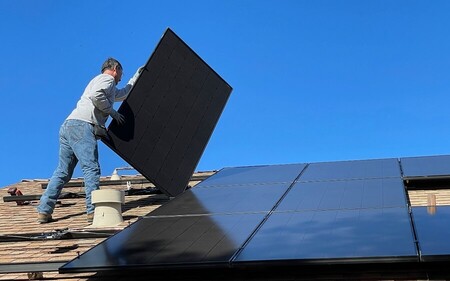We use cookies on our website.
Some of them are necessary for the functioning of the site, but you can decide about others.
Download our latest report for insights into the challenges and solutions around U.S. electrification.
Download our latest report for insights into the challenges and solutions around U.S. electrification.

What kind of battery is used for solar panels?
Benefits of lithium ion batteries
Key takeaways
You’ve probably noticed solar installations are becoming increasingly popular. According to the Solar Energy Industries Association, solar panels are growing at a rapid rate in the U.S., accounting for half of all new green energy-generating resources added in Q1 of 2022 - with residential solar systems achieving their highest quarter in history.
Not only do solar panels produce an abundance of clean energy (the amount of sunlight that reaches the earth in one hour creates more energy than humans currently use in an entire year), but federal, state and local incentives are making solar panel installations affordable and accessible to a much broader audience than ever before. However, given solar panel installations’ obvious drawback - that is, they're not producing as much electricity on cloudy days or any at night - homeowners need a way to collect the energy their solar panels produce so they can continue to power their homes during times of little to no sunlight. Enter: solar batteries.
There are three common chemical makeups of storage batteries that are used in solar energy storage systems: lead acid, lithium-ion and saltwater. Of these, lithium-ion batteries are a top choice among residential solar installations due to their efficiency, longevity and environmental-friendliness. While saltwater batteries are a close second, they are still relatively new and not yet widely available. In the same vein, lead acid batteries are attractive among homeowners in terms of affordability, but when it comes to important factors like sustainability and safety, lithium-ion batteries take the cake.
| Benefits | Lithium-ion | Lead Acid | Saltwater |
|---|---|---|---|
| MaintenanceFree | ✔️ | ✔️ | ✔️ |
| Longevity | ✔️ | ✔️ | |
| Charging | ✔️ | ✔️ | |
| Safety | ✔️ | ✔️ | |
| Sustainability | ✔️ | ✔️ | |
| Weight | ✔️ | ||
| Cost | ✔️ |
When selecting a storage system for your solar installation, there are a few standout factors that should be taken into consideration: battery safety, sustainability and the highest return on your investment. Fortunately for solar panel owners, lithium-ion batteries check all boxes.
Thanks to their chemistry, lithium batteries are some of the safest available. Their chemical makeup is extremely balanced, so they can reach high temperatures without decomposing, and will remain cool at room temperature. For further peace of mind, the lithium batteries paired with solar panel installations will not start a fire or explode, making them a top choice for homeowners everywhere.
When you factor sustainability into your decision-making, lithium-ion batteries are top notch. Not only is their chemical makeup non-toxic, but they’re rechargeable - up to nearly 5,000 times at 80% depth-of-discharge (DoD). And when it comes time to replace lithium-ion batteries, they can be recycled. Talk about full-circle decarbonization!
In addition to safety and environmental friendliness, lithium batteries simply make life easier. They charge comparatively fast - within one to three hours - depending on their size and the charging source. Not only that, but they provide consistent power when in use. So even if they’re power level is at 30%, they will still deliver the same amount of power as if they were at full charge.
When it comes to a storage system, lithium batteries prove to be the number one option for residential solar installations because they provide homeowners with the best bang for their buck. They are incredibly safe, the most eco-friendly, and they have a quick charge time and extended battery life.
If you’d really like to go the extra mile in reducing your carbon footprint, consider pairing your solar + storage system with a smart electrical panel. Smart breaker panels put the homeowner in the driver’s seat and provide them with key energy usage insights, allowing them to make the most of their own renewable resources.